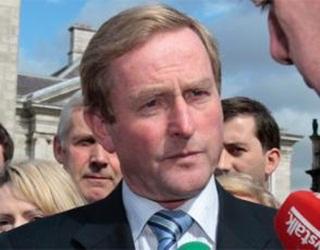Taoiseach-in-waiting a master of practised helplessness

It's time we named that traditional Irish art, much ignored in spite of its prevalence, an art handed down from father to son over generations, an art that has shaped our society more than almost every other custom, an art that has been very much in evidence again over these festive days: it's the male art of practised helplessness. By Vincent Browne
It's that learnt inability to do the most basic chores, an incapacity to cook, to clean-up, to change nappies, to soothe crying babies in the middle of the night.
That learnt male helplessness has done quite a bit to stultify this society, and to deny women a full role in public, business and professional life. It is what has kept women in the home and away from the arenas of power and influence, or rather it has helped in that – patriarchy has a broader reach than male practised helplessness.
But that practised helplessness has gone beyond the use as merely one of the tools of the subjugation of women. Little did our forefathers think that this practised helplessness would destroy this state, that many of them were keen on establishing.
Brian Cowen was helpless as Minister for Finance to do anything about overheating the economy, about inflating the property bubble, about the emerging crisis in the banks, about the collapse of the State's revenues because none of his officials told him there was any problem. The OECD, told him there was no problem, the EU said no problem, the ESRI said no problem. So what was he to do?
Brian Lenihan and Cowen had the best advice available from the Department of Finance, the Central Bank and the Financial Regulator on the night of 29 September 2008, the night of the bank guarantee. They all told the two Brians that they had no option but to guarantee everything, no matter what the cost to the State might turn out to be.
Yes, they paid Merrill Lynch €4 million to do a report over four days, and Merrill Lynch told them not to do it, but what is Merrill Lynch? One of the world experts on banking crises was 200 yards down the road in Trinity College – Patrick Honohan – but they didn't have his phone number and didn't know how to ring directory enquiries.
Then they had to negotiate a deal with the EU Commission, the European Central Bank (ECB) and the IMF because everything they had done had failed. They still believed they were the ones to proceed with – or at least oversee – the negotiation, even though neither of them had ever negotiated anything in their lives, aside from entry to a public house after hours.
Now there is going to be an election and it seems that a new government will be elected, led by someone who has Olympic gold medals for practised helplessness. He has been practising helplessness since he was elected to the Dáil in a by-election in 1975. He said almost nothing at all in Dáil debates for 20 years. He was appointed a junior minister as an afterthought in February 1986 and served for a year.
He resumed practising helplessness for almost another decade, when again, almost as an afterthought, John Bruton made him Minister for Tourism and Trade.
As leader of Fine Gael, he has revived the party's electoral prospects but he has evinced no grasp of the urgent issues that confront this society.
He now has a net satisfaction rating (the satisfied percentage minus the dissatisfied percentage) of - 39 per cent. And yet it seems this fellow will be our next taoiseach.
Twelve days ago, the government rushed the Credit Institutions (Stabilisation) Bill through the Dáil – 57 pages and 77 sections of dense technical legalise, which the Dáil passed without any appreciation of what it was it was approving.
Lenihan assured the House that he knew what the Bill was about, that it was urgent and necessary for the stabilisation of our banking system, that the world would collapse if it wasn't endorsed.
Ten days ago, on 17 December, the European Central Bank (ECB) issued a commentary on Brian Lenihan's legislation. It said that, under European law, the ECB must be consulted in advance of proposed legislative provisions on banking – and clearly this was not done in time by Ireland.
It said it had concerns that the draft legislation (now, incidentally, firmly in law) was "insufficiently legally certain on a number of critical issues for the eurosystem".
It then went on to list a whole host of issues which should be changed in the legislation – legislation that had gone to the President for signature by the time the ECB issued its commentary.
For instance, it pointed out that the provision in the legislation related to Anglo Irish Bank "appears to go beyond the position agreed with the IMF and European Commission".
That practised helplessness has extended right to the heart of our government and, apparently, is now alarming the ECB, having previously sent the financial markets into a tizzy. Wait till they meet Enda.
PS: If I may say so myself, I have been one of the foremost, expert practitioners of practised helplessness. My family (all women) claim it is my greatest expertise – by far!
